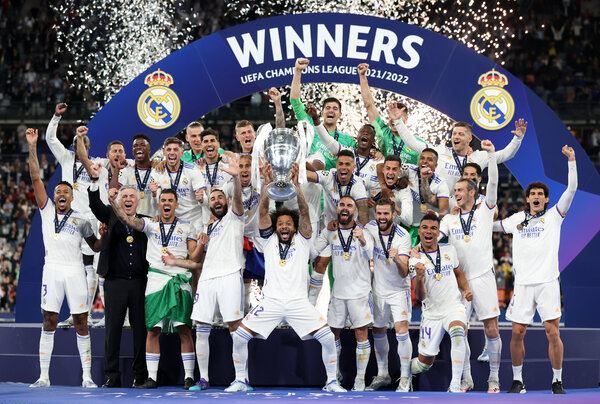
Deep down, Real Madrid does not believe in magic. Or, rather, it does not only believe in magic. It might have spent much of the last three months apparently touched by some golden light, its run to the Champions League final a dream of stirring comebacks and insurmountable odds and impossible triumphs.
Those triumphs, against Paris St.-Germain and Chelsea and Manchester City, might have seemed to prove that ultimate victory in this competition is Real Madrid’s irrevocable destiny, that it is driven by some elemental, unstoppable force, one that defies rational explanation and brooks no resistance.
After the curtain had been lifted and the veil drawn, though, when reality’s cold light poured in, there was no magic at all. There was, instead, just a plan: a painstakingly crafted and expertly executed plan that ended, as it always seemed like it would, with Real Madrid lifting yet another European Cup.
That, in a sense, was the twist: There was no twist. Real Madrid beat Liverpool, 1-0, on Saturday in Paris with a performance of ruthless efficiency, of meticulous organization, of clinical obduracy. To do so, it required not only a single goal, scored by Vinícius Junior, but really only a single attack, a single move, a single chance.
It leaned, it is true, reasonably heavily on its goalkeeper, Thibaut Courtois, in those fleeting moments when Liverpool — another team in possession of a very particular sense of its own destiny — seemed to be gathering a head of steam. But it is one of soccer’s most cherished misapprehensions that having a good goalkeeper is just another form of luck.
They are part of the team, too, after all; to beat Real Madrid, it is necessary to beat Courtois, and the reason the former is so difficult is because the latter, at times, appears to skirt the impossible. Real Madrid could risk absorbing pressure, conceding chances, safe in the knowledge that Courtois is a redoubtable last line of defense.
Even he, though, found his role diminishing as the game wore on. Those last few minutes, as Real Madrid waited impatiently to claim its glory, did not build to some deafening climax. Instead, if anything, the game ambled gently to a close. There were some substitutions. Liverpool committed some injudicious and unnecessary fouls. Real dawdled over some free kicks. The whistle blew. The trophy was presented. Everyone went home.
It felt, in truth, like something of a non sequitur: Not only because Real Madrid has spent the spring finding ever more improbable ways to win games, but because that sort of drama is now an essential ingredient in this competition.
Breathless fervor, something bordering on persistent mayhem, has become the hallmark of the modern Champions League. It is what has helped turn it, for all the enduring concerns over its domination by a tiny cabal of clubs from a small group of countries, into such a consistently compelling spectacle. No victory is ever secure. No game is ever over. Nothing is ever certain. That is what makes it so compelling.
Saturday’s final, by contrast — delayed by more than half an hour because of a complete organizational breakdown outside the Stade de France — seemed to belong to a prior incarnation of the tournament, when European soccer’s showpiece occasions were far more tentative, when the slightest mistake tended to prove fatal, when games were decided by which team seized individual moments, rather than which could best harness some elusive, vaguely ethereal form of momentum.
And yet, below the surface, there was an undeniable thematic consistency to Real Madrid’s victory, its record 14th title in the competition. The composite may have seemed distinct from all of the games that brought Carlo Ancelotti’s team to Paris — and the coach himself to a record fifth Champions League final — but the strands were almost exactly the same.
Jürgen Klopp, the Liverpool coach, spoke last week of Real Madrid’s ability to “keep the door open.” In all of its previous knockout games, it had faced moments when elimination seemed all but certain but still found a way to cling on. What looked like magic was underpinned by the distinctly material virtues of resilience, and courage, and indomitability.
So it was in Paris. For all that Liverpool and Real Madrid have in common — both are members of European soccer’s aristocrat class, both believe themselves to have a special relationship with the Champions League — their approaches to maintaining their modern superiority could not diverge more sharply.
Liverpool is a reflection of what soccer has become, an information-soaked industrial complex, in which no gain is too marginal, in which decisions are driven by data, in which even throw-ins can be weaponized, made more efficient. It has worked, too: This was the club’s third Champions League final in five years.
Real Madrid, on the other hand, tends toward a slightly more simplified interpretation. The team that wins, as far as Real can tell, generally employs the better players, up to and including the one wearing gloves. Not simply in terms of talent, but experience, grit, composure under the most intense pressure and a refusal to wilt, too.
Ancelotti’s team displayed all of those qualities in abundance. It did not so much as blink as Liverpool fizzed and fretted around its penalty area in the first half. At times, Real Madrid seemed to be standing still, daring its opponent to try to forge an opening.
Nor did it freeze after Vinícius had taken his chance — the chance — and Liverpool had nothing left to lose. Real Madrid’s players seemed blissfully unaffected by the ticking of the clock. They did not hurry or panic or sink back on themselves. They looked, instead, as if they had all the time in the world.
Perhaps that should not be a surprise. After all, for a considerable proportion of the team, this was a fifth Champions League final. They have been here before, time and time again, and they know how it turns out. They know what is required, and it is not magic. Magic, after all, is just a way of explaining the parts of reality that you do not understand, and Real Madrid understand this all too well.
Far better, instead, to have a plan, painstakingly crafted and perfectly executed and always ending in the same way, the way it ended here: in a blizzard of white ticker tape and Real Madrid, beaming, holding the European Cup aloft.




